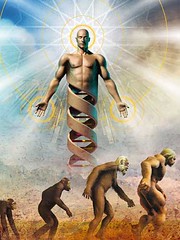Or maybe I'm just reading too much into this innocuous blog post.
 Over at Sentient Developments, George P. Dvorsky has elaborated on the original list (linked to above) with an expanded and revised list that includes definitions (as one of the apparently non-intellectuals, since I didn't know some of the terms, I am grateful for this).
Over at Sentient Developments, George P. Dvorsky has elaborated on the original list (linked to above) with an expanded and revised list that includes definitions (as one of the apparently non-intellectuals, since I didn't know some of the terms, I am grateful for this).Here is Dvorsky's explanation of the list and a few of the first entries (in alphabetical order):
First, I am trying to come up with a list of the most fundamental and crucial terms that are coming to define and will soon re-define the human condition, and that subsequently should be known by anyone who thinks of themselves as an intellectual. I admit that there's an elitist and even pompous aspect to this exercise, but the fact of the matter is that the zeitgeist is quickly changing. It's not enough anymore to be able to quote Dostoevsky, Freud and Darwin. This said, while my list of terms is 'required' knowledge, I am not suggesting that it is sufficient.You can (and should) read the rest of the list.
My definition of an 'intellectual' also requires explanation. To me an intellectual in this context is an expert generalist -- a polymath or jack-of-all-trades who sees and understands the Big Picture both past, present and future. While I value and respect the work of specialists, they can be frustratingly out of touch with other disciplines and some of the more broader applications of science, technology and philosophy. Given the obvious truism that nobody can know everything, there is still great value in having individuals understand a diverse set of key principles.
Also, I admit that my list is biased in favour of my own personal specialties and interests, but I have made a conscious effort to be as cross-disciplinary as possible. There are terms from computer science, cosmology, neuroscience, environmentalism, sociology, biotechnology, philosophy, astrobiology, political science, and many other fields.
Finally, I tried to be as generalized as possible and keep the number of terms down to a minimum; I made an effort to include other integral concepts in the descriptions.
With that lengthy preamble complete, here is my revised list:Accelerating Change: That the pace of technological development is accelerating is now undeniable. The steady onslaught of Moore's Law and its eerie regularity is the most profound example. As thinkers like Ray Kurzweil and others have shown, the onslaught of accelerating change throws commonly held time-frames out the window. And that this rate of change is exponential implies radical social disruption around the mid-point of the 21st Century. Anthropic Principle: Once considered a philosophical lark, the anthropic principle has become an integral methodological tool with which to best analyze the extreme unarbitrariness of the Universe's parameters. The AP, which suggests that our Universe's qualities are unavoidable in consideration of the presence of observers, has helped cosmologists, astrobiologists and quantum physicists as they work with such related concepts as the fine-tuning hypothesis, string theory, and various multiverse theories. Artificial General Intelligence: This ain't your daddy's AI. Rather, AGI describes the kind of intelligence that you and I have -- the commonsense knowhow we have when we're put into unfamiliar situations. Once developed, artificial agents endowed with AGI will be non-specialized intelligent entities that will come to represent the bona fide synthetic equivalent to human intelligence, and then move beyond. Augmented Reality: AR describes the fusion of the real world with the virtual. By using eyetaps, eartaps and implants, individuals will be able to filter unwanted information from their sensory fields (such as annoying advertising and sounds). Alternately, users will have new information virtually inserted into their environment, including descriptions of landmarks, maps, or even an alert notification that a familiar person is approaching. Imagine the gaming possibilities... Bayesian Rationality: Bayesian rationality is a probabilistic approach to reasoning. Bayesian rationalists describe probability as the degree to which a person should believe a proposition. They also apply Bayes' theorem when inferring or updating their degree of belief when given new information. Some scientists and epistemologists hope to replace the Popperian view of proof with a Bayesian view. Cosmological Eschatology (aka physical eschatology): CE is the study of how the Universe develops, ages, and ultimately comes to an end. While hardly a new concept, what is new is the suggestion that advanced intelligence may play a role in the universe's life cycle. Given the radical potential for postbiological superintelligence, a number of thinkers have suggested that universe engineering is a likely activity for advanced civilizations. This has given rise to a number of theories, including the developmental singularity hypothesis and the selfish biocosm hypothesis.
This is actually an interesting post, despite my making fun of the premise. I tend to agree, from an integral point of view, that future "intellectuals," whatever that term really means, will need to be at least marginally educated in a vast array of fields. The age of the specialist is past.
And as people interested in integral understanding, I think we will NEED to be well versed in as many fields of knowledge as we can be. The world -- and our understanding of it -- is too interrelated to be simply grasped through a single field of knowledge.
In that sense, I think this list is worthy effort toward creating a dialogue in the direction of integral knowledge.
Tags:
No comments:
Post a Comment